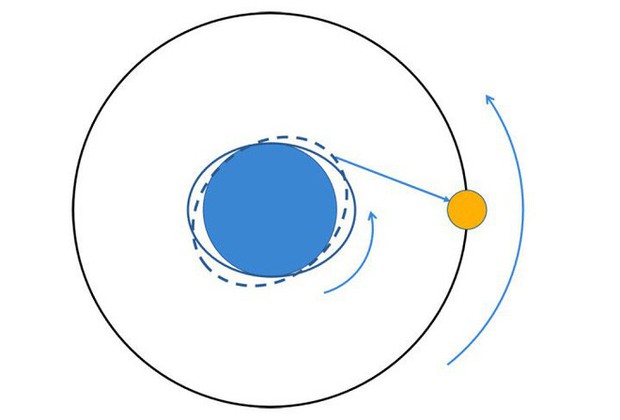As the only natural satellite orbiting the Earth, the Moon tends to be further and further away from our planet.
Due to the impact of the tides in the Moon-Earth system, the dissipation of tidal energy results in the further disintegration of the orbit of the Moon, which means that the distance between the Moon and the Earth will be more and more distant. Today, the average distance between Earth and the Moon is approximately 384,400 km. So what is the distance between the Earth and the Moon during the time of the dinosaurs? Does the Moon look bigger now?
Due to the topography of the Earth, different regions of the Earth will see the Moon in different proportions, so the gravitational pull of the Moon will cause a tidal effect on the Earth. While the Earth itself is still spinning, the earth’s tide rise will tend to be in the opposite direction of rotation, slowing the Earth’s rotation.
The moon revolves around the Earth on its own, but it is tidal locked with our planet. Therefore, the orbital period of the Moon coincides with its rotation, moreover, the angular dynamics of the Moon-Earth system is always preserved, this phenomenon is the loss of the energy of the two crystals.
In addition to slowing down the rotation of the Earth’s axis, this also caused the Moon’s orbit to expand.
It can be seen that over the last billion years, the rate of decay of the orbit of the Moon has not changed much and the change in Earth-Moon distance over time is essentially linear. To facilitate the calculation, scientists believe that the rate of decay of the lunar orbit in the past is similar to that of the last billion years, about 3.82 cm / year.
Dinosaurs first appeared around 240 million years ago. At that time, the average distance between Earth and the Moon was about 375,200 km, closer to 9,200 km today.
It can be seen that this variation in distance is not very large, the average apparent diameter of the moon 240 million years ago was 0.531 degrees and currently the average apparent diameter of the moon today is approximately 0.518 degrees.
As a result, the area of the Moon seen from Earth 240 million years ago was only 5% larger than it is today, and this change in proportions would also not be detected with the naked eye.
According to calculations, during the initial formation, the distance between the Moon and the Earth was just over 20,000 km.
As the moon moves away from Earth, the cycle of rotation itself around the axis of the third planet in the solar system gradually increases. The current Earth rotates in about 24 hours, in the age of dinosaurs it was 21 hours and only 4 hours in the early days of Earth.
According to calculations, with the speed away from Earth from the Moon over the past 10,000 years, the Moon has traveled 380 m from Earth.
Thus, it will take approximately 5 billion years for the Moon to travel 200,000 km. Even so, the Moon would still be in Earth’s orbit with a different cycle from the current one.
In five billion years, this is also the time when the Sun enters a period of crustal swelling and becomes a red giant so large that it crushes Venus, Mercury and the Earth and the Moon.
A human life has a long time to worry about.



